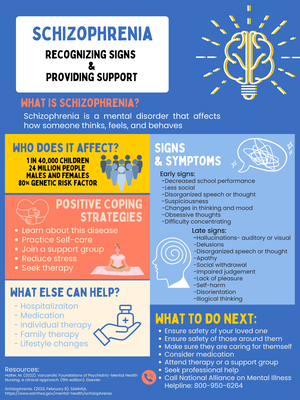- Information
- AI Chat
Was this document helpful?
Student Course Guide - Topic 2
Course: Behavioral Health Nursing (NSG-322)
77 Documents
Students shared 77 documents in this course
University: Grand Canyon University
Was this document helpful?

NSG 322: BEHAVIORAL HEALTH NURSING – Student Course Guide
TOPIC 2: Depressive Disorders
TOPIC OBJECTIVES:
In this topic, you will learn how to utilize nursing interventions and medications to develop care plans and treat clients experiencing
depressive mood disorders. You will study the basis of genetic and biological theories and how neurotransmitters work in medications used to
treat mood disorders. You will also learn to identify specific mood disorders occurring across the life span, their treatments, nursing
interventions, and mood stabilizing medications used in treatment
Objectives:
1. Examine the psychosocial, cultural, and spiritual influences; signs and symptoms; age-related considerations; and evidence-based
screening and assessment tools related to depressive disorders, including major depressive disorder, persistent depressive disorder,
disruptive mood dysregulation disorder, postpartum depression, and premenstrual dysphoric disorder.
2. Demonstrate an evidence-based approach to assessment and prevention of suicide and non-suicidal self-injury, considering client
risk and protective factors, social and spiritual supports, and psychosocial history.
3. Utilize the nursing process to develop a client-centered nursing care plan including client and family education, self-care strategies,
and follow-up care for clients with depressive disorders.
4. Discuss the classification, therapeutic effects, major adverse effects, client and family education, and nursing considerations of
medications used in the treatment of depressive disorders.
5. Utilize therapeutic communication and non-pharmacological interventions to support clients experiencing depressive moods or
suicidality.
TOPIC CONTENT – BOOK HEADINGS LEARNING ACTIVITIES
AND ASSESSMENTS
Foundations of Psychiatric -Mental Health Nursing
Chapter 14 Depressive Disorders
Disruptive Mood Dysregulation Disorder (DMDD)
Persistent Depressive Disorder (PDD)
Reading Assignment:
Foundations of Psychiatric-
Mental Health Nursing
Halter, M. (2022). Varcarolis’
Foundations of Psychiatric-Mental
Health Nursing: A Clinical
Approach (9th ed.) Elsevier. ISBN:
978-0-323-69707-1






